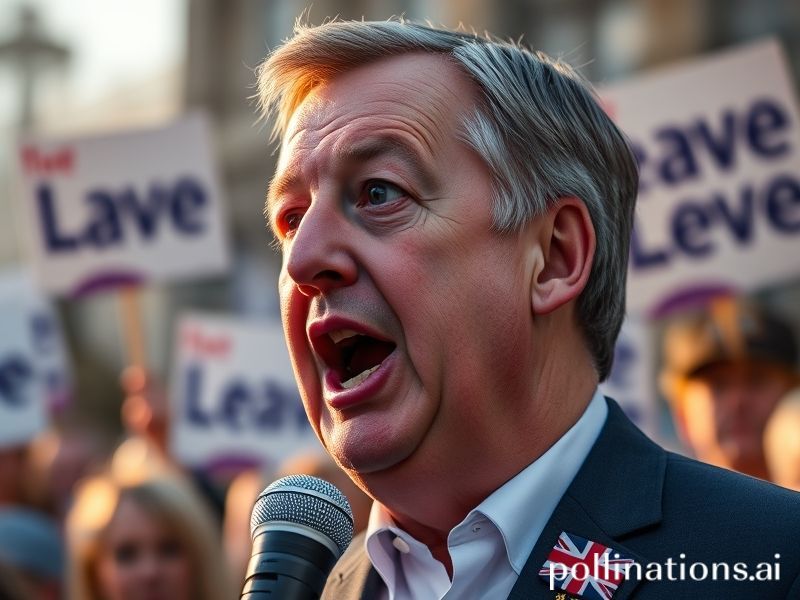nigel farage
Nigel Farage: The Man Who Weaponised Nostalgia and Won the World’s Attention
By Dave’s Locker International Desk
The planet’s pundits spent years dismissing him as a pint-sized sideshow in pin-stripe, yet Nigel Farage has quietly become the Brexit Age’s answer to Rasputin: apparently un-killable, faintly perfumed by beer foam, and still pulling strings long after the main act supposedly ended. From the neon sushi bars of Tokyo to the cavernous soy-silos of Iowa, traders now reflexively check their terminals for “Farage headline risk.” When a man can move both the pound and the pork-belly futures by merely tweeting a Union Jack emoji, it’s time to admit the global village has installed a populist jester in its central square.
Farage’s career arc is an international masterclass in monetised grievance. After helping steer Britain into its own constitutional iceberg in 2016, he pivoted faster than a Goldman Sachs intern spotting a regulation loophole. Instead of vanishing into the lucrative after-dinner circuit, he franchised his brand of nostalgic nationalism like a fast-food chain. Pop-up Farages have since appeared in German beer halls, Italian piazzas, and even Australian mining towns where citizens who can’t locate Dover on a map nevertheless chant “Take Back Control.” It’s the political equivalent of selling Hawaiian pizza in Naples—culturally offensive, inexplicably profitable.
The international significance lies in the export model. Farage’s playbook—anti-elite rhetoric, dog-whistle immigration talk, and a carefully cultivated bloke-next-door vibe—has been photocopied from Washington to Warsaw. Marine Le Pen sends him Christmas cards; Brazil’s Bolsonaro once asked if Farage could teach his press team how to smirk while tanking the real. Even Canada’s convoy protesters waved Union Jacks beside their maple leaves, proving that discontent, like COVID, mutates across borders faster than customs officers can say “PCR test.”
Global markets watch him the way medieval peasants watched comets: with dread, superstition, and the sneaking suspicion it’s all their fault. When Farage announced a new political vehicle—this one called “Reform UK,” sounding less like a party and more like an overdue plumbing bill—sterling wobbled and European banks quietly stress-tested for another referendum they swear could never happen. Analysts now speak of “Farage moments,” defined as any 48-hour period when British politics resembles performance art and liquidity evaporates faster than ethics at a lobbying conference.
The broader significance? Farage exposes the fragility of centrist gravity. Traditional parties—those lumbering beasts of ideology and focus-group flesh—assumed voters would eventually return to the fold like errant sheep. Instead, they discovered the sheep were actually cats: aloof, easily distracted, and prone to following whatever laser-pointer of outrage flickers across their Twitter feed. Farage’s genius was never policy; it was recognising that in a 24-hour outrage economy, a well-timed smirk on morning television can be worth more than a 400-page white paper nobody’s intern will read.
Meanwhile, the world’s diplomats treat him like a diplomatic unexploded ordnance. Washington invites him to CPAC because fear is a bipartisan commodity. Brussels keeps a laminated photo of his grin on the dartboard in the Commission canteen. The Kremlin allegedly funds talk-radio hosts who play his greatest hits on loop, presumably under the theory that anything destabilising the West is worth a few rubles and a crate of vodka. Even China’s state media has run breathless segments on “the Farage phenomenon,” presumably fascinated that a man can openly insult his own parliament without waking up organ-less in a Shenzhen warehouse.
And yet, for all the global panic, Farage’s true constituency remains the same: people who feel the future promised them a flying car and delivered a zero-hours contract. His trick is to convince them the missing flying car was stolen by immigrants, Brussels bureaucrats, or woke university professors—anyone except the financial engineers who actually dismantled the production line. It’s a shell game performed with such conviction that even the shells start to believe they’re guilty.
As COP28 delegates argue over fractional carbon targets and AI ethicists draft open letters nobody will enforce, Farage stands on the periphery, pint aloft, promising a simpler yesterday that was never simple. The planet may fry, supply chains may fracture, but somewhere a camera will find him grinning like a man who’s just discovered the bar serves subsidised nostalgia by the gallon.
And that, dear reader, is the most international lesson of all: in an age when reality feels negotiable, the loudest nostalgist gets the final round. Chin-chin.







